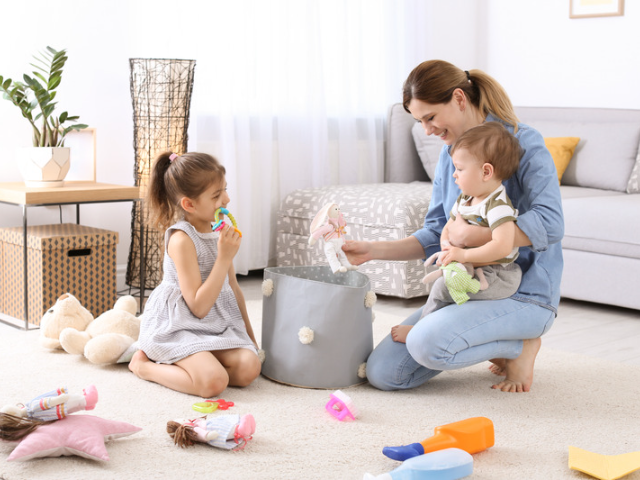Organizational skills can be a challenge to master for many young children. While children are still quite young, certain daily strategies can help them learn and build basic organizational skills. The following list suggests several tips that can be helpful for you and your child.
Tips for Teaching Organizational Skills
- Take the time to observe your child’s challenges and pick one that you wish to work on. This will make it easier to gradually build in changes. Avoid trying to work on everything at the same time.
- Also, make use of illustrated routines. These can be weekly routines, a tooth brushing routine, a hand washing routine, a getting dressed routine, etc. All of these routines can be difficult for children to remember and perform. For this reason, visual aids are helpful in completing routines step by step with your child. Children will gradually begin to complete these routines on their own.
- Use clear storage bins for simple cleanup. Putting toys away in the right place can be challenging for many children, so using bins that are clearly labeled will help your child during cleanup time. It is also helpful to use simple pictures to identify your storage bins.
- Display your child’s picture on their cubbyhole, bins, baskets, etc. Seeing their picture will make it easy for your child to know where to put their personal belongings. Visual cues are great for helping children get organized.
- Place Post-it notes or pictures in certain locations. These will act as reminders. For example, sticking a picture of shoes in your child’s cubbyhole may help them remember to put their shoes in this spot after entering the house.
- Children with organizational skills difficulties can often have trouble picking an activity during play. You can make a chart using several pictures to show different game and activity suggestions. Then your child can use the chart to pick and choose what they would like to do. If your child continues to have trouble selecting an activity, limit the number of choices. For example, you may offer three or four choices instead of ten.
- Create a Yes Space – a space dedicated to play where your child has free rein to use as they see fit. This doesn’t have to be a formal room. It can be a shelf in the living room or a little table set up in the kitchen with your child’s favorite toys and books, so they can play while still being near you.
- Let your child’s interests lead the way. Stock your Yes Space according to your child’s hobbies. Look at which items they’re naturally drawn to and hold their attention the longest.
- Factor in your parenting pet peeves when teaching organizational skills. If you’re worried about crayons or paints ending up on the walls, provide a wide paper roll that gives your child enough room to color or paint within the boundaries. Think about the behaviors you’re always saying no to and correct these behaviors when creating your play space.
- Create mini pockets for play. This is useful if your Yes Space has to cater to multiple children. For example, you can make zones within your child’s play space. There can be an art area, a spot for dolls, a dress-up nook, etc.
- Switch your child’s Yes Space up often. Don’t think of it as a fixed space-it will change according to your child’s needs. If you notice your child isn’t playing in a certain area or hasn’t touched an item for a long time, change it up a bit. You can reorganize the displays by combining toys in different ways and positioning unloved ones next to your child’s favorite games to help them see everything in a new light. Plus, it will cut down on extra stuff.
- Lastly, turn organization into an opportunity for responsibility. By using the tricks above, you will be encouraging independent behavior. Your child will choose what they play with, keep their spaces organized, and clean up after themselves.
Teaching your child organizational skills doesn’t have to be a huge effort. In fact, it can be fun. By staying consistent, your child will learn and demonstrate organizational skills quickly!



